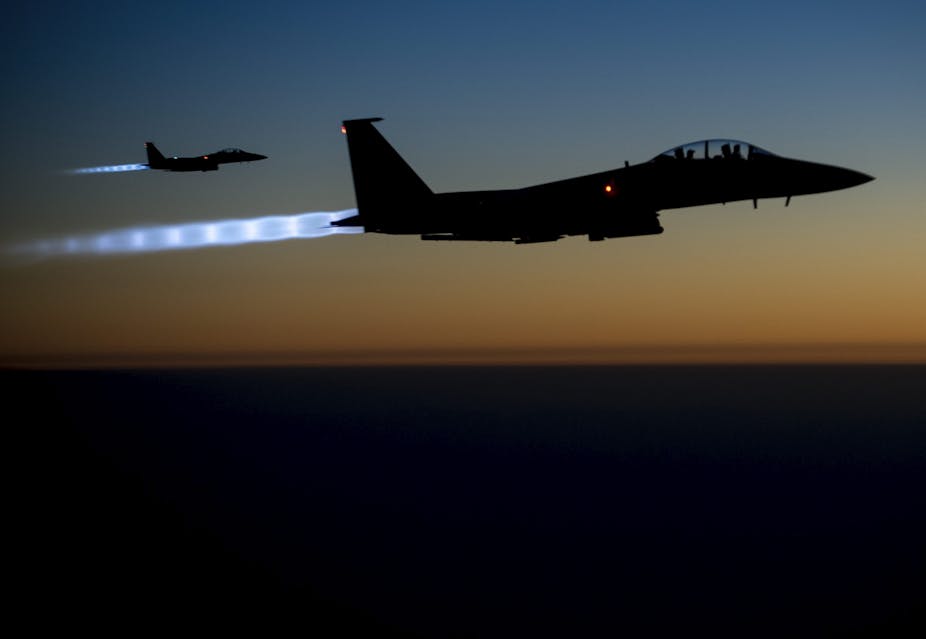The United States’ reluctance to become decisively committed to the complex quagmire in Syria is understandable. However, its plan to insert a US-trained-and-equipped “moderate rebel” force into the mix is deeply concerning – on several levels.
According to reports, the US plans to deploy up to 1000 military trainers and support personnel to the region to train moderate Syrian rebel forces.
While US efforts to support rebel groups to date have been less than successful, there is so much that could go wrong with this course of action, and so little that could go right. Naturally, we only have access to the open source reporting on the plan, but from what we do know, there are many questions that demand answering.
What is a ‘moderate’ rebel?
When I asked a senior Lebanese army officer in November 2014 if there were “moderate rebels” in Syria, he simply laughed – not at my joke, but at the concept.
The reality of training and equipping a rebel force is that whoever does so becomes responsible for their actions, both on the battlefield and off it. There are claims that the US has “vetted” the thousands of rebels it is going to train. But the vetting process assumes perfect knowledge (which doesn’t exist) and also only checks that their transliterated names haven’t shown up on someone’s database as not being “moderate”.
It is vetting by exception, and says nothing about the present or future political, religious or societal outlook of the people the US and its allies will be training and arming. Is it likely that Saudi Arabia, Qatar or Turkey will be supporting an armed organisation that seeks the establishment of a secular, pluralist democracy in post-conflict Syria? Or is it more likely that they will be seeking an outcome more in line with their own Islamist political and societal views?
Does Washington care about promoting the former, or is it willing to aid and abet the latter – as long as it guarantees stability?
Who are they meant to fight?
Should the moderate rebels fight the jihadists, the Syrian military, Iranian Quds force, Hezbollah or anyone they come up against?
Three of the countries that have allegedly agreed to host the training – Turkey, Qatar and Saudi Arabia – have long called for the downfall of Syrian President Bashar al-Assad and have been accused of explicitly or implicitly supporting various jihadist groups during the conflict. They have their own agendas, which do not necessarily match US aims.
There are reports that the moderate rebels to be trained in Turkey will be chosen by the Turkish intelligence service, which will undoubtedly do so with a view to advancing its own aims.
Who will be the targeting authority for the rebels’ operations inside Syria, and how will it be monitored in the absence of US forces? What if the rebels focus on Syrian military forces? What would be the attitude of Iran to this?
What will be the attitude of other (non-radical Islamist) groups to the introduction of US-trained rebels if these rebels are fighting against fellow Muslims in preference to Assad’s forces? What if, by targeting Islamic State (IS) on the ground, their actions simply tilt the balance in favour of another Islamist group such as Jabhat al-Nusra?
How will the US safely arm the rebels?
Without having troops on the ground accompanying the “moderate” rebels, the US has effectively lost control over the weapons it supplies.
While the ideal situation is that these groups successfully use the weapons against IS or Jabhat al-Nusra or the Syrian army and its allies, battlefields are chaotic places and Middle Eastern society is a complex web of often-changing alliances. The US-trained militia could be defeated on the battlefield and their weapons lost, as has reportedly happened previously.
Elements of these moderate rebel forces could be co-opted willingly or unwillingly to fight in support of jihadist groups against Syrian government forces or other jihadist groups. Weapons could be sold but reported as lost or they could be used in atrocities against civilians, or any number of other unsavoury permutations or combinations.
These queries are but some of many that demand an answer, without having even touched on the issue of the legality of openly equipping, training and deploying an armed group across national borders. How will they deploy them across state borders? What will the coalition do if Assad decides to target these rebel groups?
The Syrian government may well allow them to engage with and degrade IS and then target them after they’ve done Assad’s dirty work. Would the coalition of anti-Assad forces be expected to provide close air support to this group?
There are no easy solutions to an issue as complex as Syria. The unco-ordinated, short-term actions of some of the regional states have simply exacerbated what was already a hideously difficult operating environment.
If there hasn’t been a military solution to the problem that has worked in the nearly four years of the conflict, then the introduction of another 15,000 armed rebels over several years, with an indistinct aim, is unlikely to do much more than further muddy the treacherous waters.

